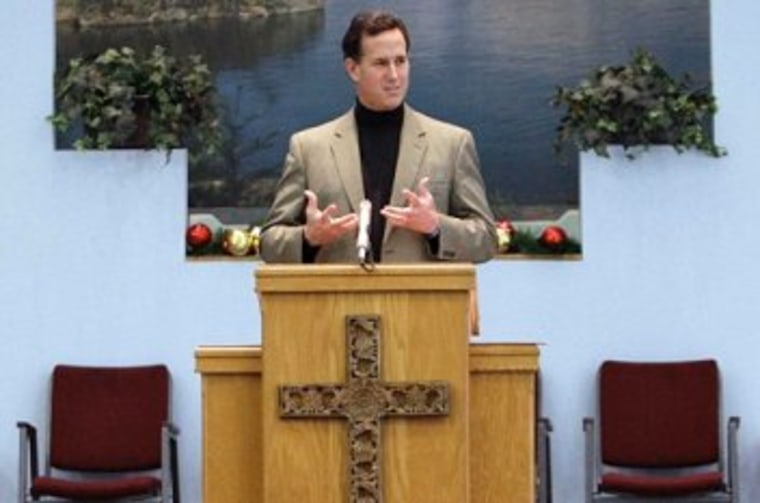In 1960, then-candidate John F. Kennedy spoke to the Greater Houston Ministerial Association, and delivered one of the important speeches in American history on the role of religion in government. Kennedy, seeking to become the nation's first Roman Catholic president, eloquently explained the value of First Amendment principles.
It seems foolish a half-century later, but there were widespread fears at the time that JFK would somehow be subservient to the pope. It led Kennedy to proclaim, "I believe in an America where the separation of church and state is absolute; where no Catholic prelate would tell the President -- should he be Catholic -- how to act, and no Protestant minister would tell his parishioners for whom to vote."
He went on to note that he was the target of "the finger of suspicion" at the time, but "tomorrow it may be you -- until the whole fabric of our harmonious society is ripped apart at a time of great national peril."
The remarks helped set a welcome, enduring standard for religion, government, and politics that responsible figures in both parties could gladly embrace.
The man who wants to become the second Roman Catholic president brings a very different perspective to the table.
GOP presidential hopeful Rick Santorum said today that watching John F. Kennedy's speech to the Baptist ministers in Houston in 1960 made him want to "throw up.""To say that people of faith have no role in the public square? You bet that makes you throw up. What kind of country do we live that says only people of non-faith can come into the public square and make their case?" Santorum said.
In the same ABC interview, Santorum added, "[A]t least according to John Kennedy," people of faith "have no role in the public square.... Kennedy for the first time articulated the vision saying, no, 'Faith is not allowed in the public square. I will keep it separate.' Go on and read the speech. 'I will have nothing to do with faith. I won't consult with people of faith.' It was an absolutist doctrine that was foreign at the time of 1960."
It's hard to overstate how deeply ridiculous Santorum's argument is. Put it this way: the former senator understands church-state separation and JFK's 1960 speech about as well as he understands the Dutch health care system.
Santorum urged viewers yesterday to "read the speech." That's an excellent idea. Any fair read of the 1960 speech will make clear that the Republican candidate simply has no idea what he's talking about.
Kennedy never said "people of faith have no role in the public square"; he simply called on government neutrality towards matters of faith. If Santorum can find anything in the speech to suggest JFK wanted "only people of non-faith can come into the public square and make their case," he should do so. If he can't, Santorum should apologize for his ignorance.
Just as a matter of electoral common sense, if a presidential candidate argued publicly in 1960 that religious people should "have no role in the public square," how is it, exactly, that Kennedy won the election two months later? Why was this speech celebrated as a landmark oration on a fundamental American principle?
What Santorum struggles to understand is that religion doesn't need government's help. America's public square already has religion in it -- turn on television or the radio and Americans can find religious programming; go to a library or book store and Americans can find religious publications; attend a sporting event and Americans can find athletes praying and celebrating their faith; pay attention to politics and Americans can find politicians from both parties speaking from pulpits, hosting prayer breakfasts, and reminding voters about their religious beliefs.
If Rick Santorum believes religious has been pushed from the public sphere, he needs to get out more.
The larger point to remember, though, is that religion in American public life is already able to thrive, not despite the separation of church and state, but because of the constitutional principle.
Whereas so many countries have official state churches, the United States, the first democracy to separate government and religion, has an open marketplace of ideas. Religious choices are left up to individuals and their personal beliefs, and the result is a vibrant, diverse culture where people are free to worship, or not, as they please.
This, apparently, makes Santorum nauseous. The challenge for the Republican presidential candidate is to offer an alternative model for voters to consider. He's offended by the Madison/Jefferson model, defended by Kennedy? Fine. What would Santorum prefer?
There are some countries that intermix God and government -- Iran, Saudi Arabia, and Afghanistan under Taliban rule come to mind -- but they're generally not countries the United States tries to emulate.
